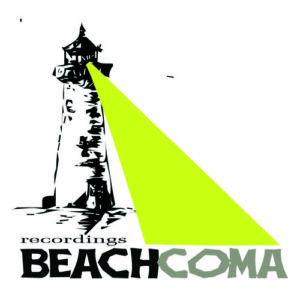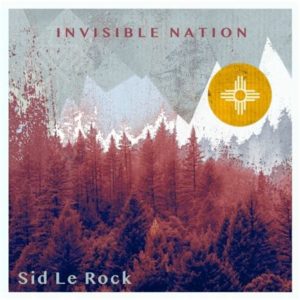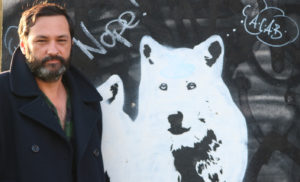In qualità di membro tribale della Algonquin First Nations, Sid Le Rock cerca di esplorare la sua eredità ancestrale per scoprire i paesaggi sonori tradizionali e cerimoniali delle popolazioni indigene dei nativi americani come componente integrante del suo nuovo progetto solista: Invisible Nation.
Sidney Sheldon Thompson (alias Sid Le Rock) è modellato dal movimento elettronico DIY, lo stile musicale è idiosincratico e le pratiche di produzione incoraggiano la sua creatività sin dalla fine degli anni ’90. Questo è un fattore che contribuisce alla sua impressionante discografia che attualmente conta dodici album sotto i suoi vari pseudonimi (Pan/Tone, Gringo Grinder, Skull Rock) comprese le collaborazioni di Sid con artisti di vari campi e generi musicali come Depeche Mode, Placebo, DJ Koze.
A proposito di elettronica fai-da-te, ascolta anche la PREMIERE da Stirpe999 Antilabel, appena uscita.

L’attuale concept dell’album di Sid Le Rock è una fusione di musica tradizionale ed elementi organici utilizzati dai popoli aborigeni del Canada, combinati con la modernizzazione dell’ elettronica. Il mix di entrambi gli stili sonori raggiunge l’equilibrio con un’importanza condivisa per il ritmo come fonte di impulso e funzionalità. È il suo equo tentativo di produrre e fornire una sintesi complementare di peculiarità sonore, metodi elettronici moderni e l’uso riproposto della musica cerimoniale, per mostrare il profondo orgoglio e rendere omaggio ai suoi antenati.
In anteprima per Parkett la traccia Muskie Lung, che a una traduzione letterale significa Polmone Muschiato, nome che riesce a racchiudere tutto quel microcosmo selvaggio ed ancestrale che Sid Le Rock vuole trasmettere, come perdersi in un bosco, ma in realtà è un gioco di parole che il produttore ci spiegherà più avanti nell’intervista.
PREMIERE – MUSKIE LUNG
Label: Beachcoma Recordings
Artista: Sid Le Rock
Titolo: Invisible Nation
Formato Release: Digitale, Vinile
Data Release: 1 aprile 2022 – digitale

Tracklist Digital
01. Eerie Loon
02. Raven (Fly On Me)
03. Algoma
04. Blind River
05. Muskie Lung
06. Grizzly
07. Nanabozho
08. Gitchegomee
09. Dog Days
10. Mite8ameg8k8 (4 Gr8 Grand-Mother)
Tracklist Vinyl
A1 Raven (Fly On Me)
A2 Grizzly
A3 Nanabozho
B1 Algoma
B2 Muskie Lung
B3 Blind River
INTERVISTA – SID LE ROCK
Ciao Sid, benvenuto su Parkett. È un piacere incontrarti. Come stai?
Ehi, il piacere è tutto mio. Grazie per l’opportunità di parlare del mio nuovo album.
Un album molto affascinante, ma andiamo con ordine. So che fai parte della tribù Algonquins First Nations, puoi raccontarcelo, farci conoscere meglio le tue radici?
Alcuni anni fa, dopo la morte di mia nonna, mio padre aveva scoperto documenti di famiglia che fanno risalire la nostra eredità a tredici generazioni, che collegano direttamente il nostro lignaggio a Marie Mite8ameg8k8e [Marie Miteouamegoukaue, cui è deticata anche una traccia, ndr]. Nata intorno al 1631, fu una delle prime donne indigene a sposare un uomo di origine europea, di nome Pierre Couc dit Lafleur. Era un soldato francese di stanza nel territorio francese del Quebec, in Canada. La loro progenie fu uno dei primi Métis conosciuti del Canada, sono persone di origini miste europee e indigene. C’è un libro pubblicato che ho acquistato chiamato “First Metis Families of Quebec” di Gail Morin, il quale mi ha sconvolto. Mi ha dato lo spunto per conoscere finalmente una parte del passato legato alla famiglia e ha risposto a molte domande che avevamo.
Infatti, il tuo ultimo album è chiaramente ispirato alle tue origini. Una traccia si chiama proprio “Mite8ameg8k8e [4 Gr8 Grand-Mother]” . Invisible Nation, però, è molto allusivo come titolo, cosa ci si nasconde dietro?
Sì, il mio nuovo album è ispirato da una prospettiva basata sia sul passato che sul presente e il concept si presta molto bene alla mia identità. Invisible Nation è in parte un commento sociale che tocca la storia sensibile e le questioni attuali che i nativi americani devono sopportare. Ma era imperativo per me concentrarmi sulla creazione di musica che riflettesse sulle virtù positive di persone orgogliose e coraggiose che vivono in una Nazione nella Nazione. Attraverso la mia musica, voglio mostrare e celebrare la loro forza, la loro resilienza e il loro orgoglio.
Perché com’è la situazione oggi? Sono ancora molto percepite le disuguaglianze sociali dei nativi americani?
È complicato, ma ovviamente le disuguaglianze sociali per i nativi americani purtroppo continuano a esistere.
Capisco. Che rapporto hai tu con la natura?
Sono cresciuto vivendo vicino alle foreste. Per gran parte della mia infanzia, la foresta è stata il mio cortile, quindi sono stato educato ad apprezzare la natura e rispettare la fauna selvatica. Ogni volta che torno a casa in Canada, un viaggio in uno dei nostri numerosi parchi nazionali è la mia vocazione, come se mi chiamassero.

La tua non è la classica techno, è intrisa di influenze e suggestioni provenienti da altri mondi musicali. Come definiresti la tua musica in poche parole?
Tutto quello che mi ispira è preso in prestito e semplicemente restituisco ciò che ho preso in prestito.
Quanto mai come in questo album dove sonorità e titoli sono evocativi di quell’anima selvaggia. Un ottimo esempio è proprio la Premiere: Muskie Lung, ricca di riferimenti naturali, ancestrali. Che ricerca c’è stata per arrivare a questo suono?
Un gioco di parole, Muskie e Lung sono i nomi associati allo stesso pesce, soprannominato anche “Il pesce dai 10.000 lanci“… quindi sì, è difficile da catturare. La canzone, tuttavia, è stata ispirata dai cerchi di tamburi e dai canti a cui ho assistito durante un Pow-Wow. È una celebrazione cerimoniale di musica e danza che è abbastanza comune vicino a dove ho vissuto una volta nell’Ontario settentrionale. Questo però avviene in gran parte del Nord America.
Ma nel tempo hai anche elaborato tracce più sintetiche, remixando e collaborando con Depeche Mode, Placebo, Fairmont, Dj Koze tra gli altri. In questo senso, mi chiedo, come è avvenuta la tua crescita musicale, cosa hai ascoltato e cosa ti piace ascoltare adesso?
Sono un prodotto degli anni ’70 e ’80, molte delle mie influenze e la musica che ascolto oggi provengono da quel lasso di tempo.
Una domanda che faccio spesso agli artisti più interessanti. Qual è il tuo set-up? Usi anche strumenti musicali analogici per creare la tua musica?
Sì, il mio set-up è semplice e piuttosto noioso, è in particolare per i drogati di tecnologia e gli audiofili. Per ogni canzone che ho composto, qualunque sia la fonte creativa o qualunque attrezzatura sia a portata di mano, cerco di farne il miglior uso per ottenere l’effetto desiderato.
Siamo giunti al termine e ti ringrazio per la chiacchierata. L’ultima domanda, tuttavia, non è realmente una domanda. Stiamo uscendo da una pandemia e in Europa c’è una guerra a cui forse non siamo abituati. Pertanto, mi piace lasciare uno spazio libero dove l’artista possa esprimersi liberamente e magari condividere un pensiero con noi.
I tempi sono difficili, non c’è dubbio che stiamo tutti vivendo in una colossale tempesta di merda [il termine usato è shitstorm, ndr] che ci soffia in faccia. Continuiamo a creare, cercare la conoscenza e, si spera, acquisire fiducia in noi stessi per non votare mai più coloro al potere che non hanno le capacità di istruire e costruire per il bene dell’umanità e della Madre Terra.
Grazie per la tue belle domande e il tuo tempo, Nicola.
leggi anche: Ucraina, intervista ad Andre Skred di Analogue Network: “Non vogliamo essere schiavi”
Grazie a te per essere stato con noi e aver condiviso le tue idee, Sid. Ciao.

Per capire meglio le condizioni dei nativi americani vedi il rapporto di ‘The Canadian Encyclopedia‘ su Social Conditions of Indigenous Peoples in Canada
ENGLISH VERSION
Ciao Sid, welcome to Parkett. It is a pleasure to meet you. How are you?
Hey there, the pleasure is all mine. Thanks for this opportunity to discuss my new album.
A very fascinating album, but let’s go in order. I know that you are part of the Algonquins First Nations tribe, can you tell us about it, let us know your roots better?
A few years ago after the passing of my grandmother, my father had uncovered family documents that traces our heritage back to thirteen generations, which directly connects our lineage back to Marie Mite8ameg8k8e [MarieMiteouamegoukaue, – Ed]. Born around 1631, she was one of the first Indigenous women to marry a man of European descent, by the name of Pierre Couc dit Lafleur. He was a soldier from France that was stationed in the French territory of Quebec, Canada. Their offspring were one of Canada’s earliest known Metis, which are people of mixed European and Indigenous ancestry. There’s a published book that I purchased called “First Metis Families of Quebec” by Gail Morin, which blew my mind. It gave me credence to finally know a part of my family’s connection to the past and answered many questions that we had.
In fact, your latest album is clearly inspired by your origins. One track is called “Mite8ameg8k8e [4 Gr8 Grand-Mother]” Invisible Nation, however, is very allusive as a title , what lies behind it?
Yes, my new album is inspired by both a past and present perspective and the concept lends itself very well to my identity. Invisible Nation is partially a social commentary that touches upon the senstive history and current issues that the Native Americans endure. But it was imperative for me to focus on creating music that reflects on the positive virtues of prideful, courageous people living in a Nation within a Nation. Through my music, I want to showcase and celebrate their strength, resilience, and pride.
Why, how is the situation today? Are the social inequalities of Native Americans still very much perceived?
It’s complicated, but of course the social inequalities for Native Americans unfortunately continue to exsist.
What relationship do you have with nature?
I grew up living next to forests. Much of my childhood, the forest was my backyard, so I was raised to appreciate nature and respect wildlife. Whenever I return home to Canada, a trip to one of our many national parks is my calling, as if they called me.
Your music is not classic techno, it is imbued with influences and suggestions from other musical worlds.How would you define your music in just a few words?
Everything that is inspiring, is borrowed. I’m simply returning what was borrowed.
As never before in this album where sounds and titles are evocative of that wild soul. An excellent example is the Premiere: Muske Lung, full of natural, ancestral references. What research was there to get to this sound?
Insider joke, Muskie and Lung is the names that are associated to the same fish. also nicknamed “The fish of 10,000 casts“… so yeah, it’s hard to catch. The song, however, was inspired drum circles and the chants that I’ve been exposed to at Pow Wow’s. This is a ceremonial celebration of music and dance that’s quite common near to where I once lived in Northern Ontario. But this takes place across most parts of North America.

But you have also worked out more synthetic tracks over time, remixing and collaborating with Depeche Mode, Placebo, Dj Koze among others. In this sense, I wonder, how did your musical growth take place, what did you listen to and what do you like to listen to now?
I’m a product of the 70 to 80’s, so many of my influences and the music I listen to today comes from that time span.
A question I often ask the most interesting artists. What’s your set-up? And do you also use analog musical instruments to create your music?
Yeah, my set up is simple and quite boring, particularily for the tech junkies and audiophiles. For each song I composed, whatever the creative source may be or whatever equipment is nearest in reach, I make the best use of it to achieve my disired effect.
We have come to an end, and I thank you for the chat. The last question, however, is not really a question. We are emerging from a pandemic and in Europe there is a war that we are perhaps not used to. Therefore, I like to leave a free space where the artist can express himself freely and maybe share a thought with us.
Times are rough, there is no doubt that we are all experiencing the colossus amount of shitstorms blowing in our faces. We continue to create, seek knowledge, and hopefully gain confidence in ourselves to never again vote those in power that do not have the abilities to educate and create for the goodness of humanity and Mother Earth.
Thanks for your great questions and your time, Nicola.
